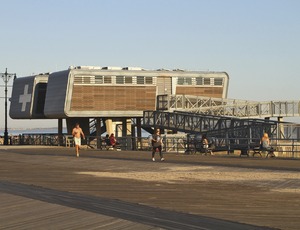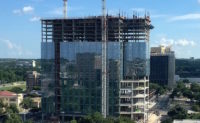
Memorial Day weekend, 2013, was a triumph for New York City as it reopened its ravaged beaches seven months after Superstorm Sandy. To do so, New York City had three months earlier hired Triton Structural Concrete, a part of contractor T.B. Penick & Sons, to build and install most of 35 lifeguard and bathroom station modules at city beaches for $105 million.
The project is one of ENR's Best of the Best projects, but behind the scenes Penick says its main subcontractor, modular builder Deluxe Building Systems, failed to perform. Penick terminated Deluxe in August and placed and finished the last of the modules with its own staff and other subcontractors.
Penick believed it had insurance covering the costs of the default. When Omaha-based Arch Specialty Insurance Co., which had provided Penick a subcontractor default policy, requested much documentation and still refused to pay, the contractor filed a lawsuit in state court in San Diego, Penick's base city. Over the contractor's objections, Arch forced Penick to arbitrate in New York this year.
Penick accuses Arch and its co-insurer, Catlin Specialty Insurance Co., of failing to back the promise in the policy. The contractor's attorney, Robert J. Marks, said in a statement that the insurance policy clearly states that "payment should have been made within 30 days of submitting and documenting a claim, and a partial payment should have been made for cash-flow purposes in the event the claim was still being investigated.
Yet 18 months later, and despite delivering 10 boxes of supporting documents, Penick and Triton haven't received a cent."
The conflict is unusual because few of the 2,000 or so claims under subcontractor default insurance since such policies were initially written 19 years ago have been disputed publicly. While a surety's response to a bond claim by a general contractor with a failing sub is often portrayed as a slow-motion minuet, subcontractor default insurance is in theory a faster-responding product that provides cash to the prime contractor to keep a project moving along.
Whether the Penick case represents a fundamental shortcoming or is only a reflection of the details of a single disputed claim, has to be evaluated in light of subcontractor default insurance's growing market share, said to cover $48.6 billion of work in 2012. Many big prime contractors use it.
Penick President Tim Penick declined to comment on his company's $32-million lawsuit, as did Arch, Catlin and Berwick, Pa.-based Deluxe. Two other companies, Penick's longtime insurance broker, San Diego-based Barney & Barney, and St. Paul-based Construction Risk Underwriters (CRU), also are defendants. Through its parent company, Marsh, Barney & Barney declined to comment, and CRU could not be reached.
The issues in the conflict seem to belong to a broader discussion of insurance policies, meetings of the mind and time pressure.
One subject that may figure prominently in the arbitration proceeding will be the tight time frame in which Penick won the beach module subcontract, signed up for the subcontractor default insurance, paid a $187,000 premium for a policy with an each-loss limit of $20 million and began dealing with Deluxe over how the contract was going. The arbitrators will be forced to scrutinize those dates to see how they jibe with the language in this and most other policies that allows the insurer to reject a sub default claim if the prime contractor has misrepresented the sub's condition or ability, or has assumed control of its work.




Post a comment to this article
Report Abusive Comment